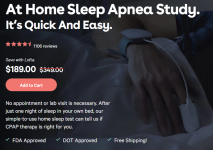Anybody else use one? I've had mine for over a year now and it has been life changing. My wife has complained about my snoring for years. I always brushed it off as her being a light sleeper. Over the years, however, I found myself getting more and more tired during the day. It got to the point where I was getting scared to drive to client meetings in the morning for fear of trying to stay awake through the crazy bay area traffic. I could sleep 10 hours a night and still wake up feeling tired and groggy. Last spring I finally got over my stubbornness and scheduled an appointment with a local ears, nose and throat doc.
The doc was cool. I told him about my current training and past powerlifting experience. He ordered an in-home sleep study. I didn't know how common these had become but apparently this is how most sleep studies are done now. No need to go spend 2 nights in a sleep lab which is what I had been dreading. I picked up the equipment from the lab which consisted of a heart rate monitor, pulse oximeter and a breathing monitor and nasal canula. Hooked it all up for 2 nights then dropped it off at the lab when I was done. The doc called a week later and said I had severe sleep apnea. I was waking up 35-40 times per hour each night. Ugh, I knew this meant CPAP machine.
When I first started in powerlifting I trained with a guy who used one. I remember at a meet in Vegas we shared a room and as he's getting ready to go to bed he pulls out the CPAP and says "I hope my Darth Vader breathing doesn't scare you". The machine itself sounded like a small jet engine and the facemask he wore resembled a WWI gas mask. Not exactly comfortable. This was the image I had in my mind of a CPAP machine.
When mine showed up I was pleasantly surprised. It was compact and silent. I sleep with it less than 2 ft. from my head and I can't hear it. The air is now humidified and warmed and the machine slowly ramps up to full speed as you fall asleep. It took me a good month to get used to it but now I look forward to sleeping with it. It has made that much of a difference in my life. I'm dreaming again because I can finally get in REM sleep and I wake up refreshed nearly every morning.
There are two major players in the space: Resmed and Philips Respironics. I personally have a Resmed Air10 and its the only one I've used. There are literally dozens of different styles and sizes of face masks to choose from depending on how you breathe when you sleep (nose or mouth) and what feels comfortable. Continuous Positive Air Pressure (CPAP) - The machine works by literally forcing air down your nose or throat to keep your airway open all night. I am a nose breather and when wearing my mask and keeping my mouth closed I do not feel any pressure or forced air. It becomes second nature to sleep with the mask after a month or two.
The machine must be cleaned on a regular basis to prevent the build up of bacteria or mold in the humidifier reservoir and the machine itself. You can use warm soapy water or diluted vinegar. Both are a pain in the ass which is why I would recommend one of the many self cleaning options available. I personally use the SoClean 2 which is a separate machine that is permanently hooked up to my CPAP. Each morning I take my facemask assembly and tubing and place it in the SoClean machine. This machine generates ozone and flushes it throughout the entire CPAP equipment chain sterilizing everything. The entire process takes about 10 minutes.
Why the long, drawn out and boring story? To hopefully shed some light on the process of getting a CPAP and to encourage more of you to explore the option. A lot of us on here are, shall we say, larger than normal and are at risk for apnea. If you've got a large neck, carry more mass than the average person (lean or otherwise) and wake up feeling tired all the time I would highly encourage you to get a sleep study. Apnea is hard on the heart and can have very negative long term effects on your health. CPAP machine can work wonders and if you have insurance they will likely cover most of if not the entire cost of the machine. If that's not an option you can pay for one out of pocket ($800-$1200) or buy one used. They are simple to setup and maintain
Life changing doesn’t begin to describe what a cpap did for me. Certainly needed it for years, it the last year before i figured it out and got on a cpap was hell. Chronic fatigue, red eyes, yawning, and big personality change. Zero patience. I was a complete ass, mostly to my girl. Two days on a cpap and not a single yawn during my 11hr day. Amazing. I won’t leave home without it.Anybody else use one? I've had mine for over a year now and it has been life changing. My wife has complained about my snoring for years. I always brushed it off as her being a light sleeper. Over the years, however, I found myself getting more and more tired during the day. It got to the point where I was getting scared to drive to client meetings in the morning for fear of trying to stay awake through the crazy bay area traffic. I could sleep 10 hours a night and still wake up feeling tired and groggy. Last spring I finally got over my stubbornness and scheduled an appointment with a local ears, nose and throat doc.
The doc was cool. I told him about my current training and past powerlifting experience. He ordered an in-home sleep study. I didn't know how common these had become but apparently this is how most sleep studies are done now. No need to go spend 2 nights in a sleep lab which is what I had been dreading. I picked up the equipment from the lab which consisted of a heart rate monitor, pulse oximeter and a breathing monitor and nasal canula. Hooked it all up for 2 nights then dropped it off at the lab when I was done. The doc called a week later and said I had severe sleep apnea. I was waking up 35-40 times per hour each night. Ugh, I knew this meant CPAP machine.
When I first started in powerlifting I trained with a guy who used one. I remember at a meet in Vegas we shared a room and as he's getting ready to go to bed he pulls out the CPAP and says "I hope my Darth Vader breathing doesn't scare you". The machine itself sounded like a small jet engine and the facemask he wore resembled a WWI gas mask. Not exactly comfortable. This was the image I had in my mind of a CPAP machine.
When mine showed up I was pleasantly surprised. It was compact and silent. I sleep with it less than 2 ft. from my head and I can't hear it. The air is now humidified and warmed and the machine slowly ramps up to full speed as you fall asleep. It took me a good month to get used to it but now I look forward to sleeping with it. It has made that much of a difference in my life. I'm dreaming again because I can finally get in REM sleep and I wake up refreshed nearly every morning.
There are two major players in the space: Resmed and Philips Respironics. I personally have a Resmed Air10 and its the only one I've used. There are literally dozens of different styles and sizes of face masks to choose from depending on how you breathe when you sleep (nose or mouth) and what feels comfortable. Continuous Positive Air Pressure (CPAP) - The machine works by literally forcing air down your nose or throat to keep your airway open all night. I am a nose breather and when wearing my mask and keeping my mouth closed I do not feel any pressure or forced air. It becomes second nature to sleep with the mask after a month or two.
The machine must be cleaned on a regular basis to prevent the build up of bacteria or mold in the humidifier reservoir and the machine itself. You can use warm soapy water or diluted vinegar. Both are a pain in the ass which is why I would recommend one of the many self cleaning options available. I personally use the SoClean 2 which is a separate machine that is permanently hooked up to my CPAP. Each morning I take my facemask assembly and tubing and place it in the SoClean machine. This machine generates ozone and flushes it throughout the entire CPAP equipment chain sterilizing everything. The entire process takes about 10 minutes.
Why the long, drawn out and boring story? To hopefully shed some light on the process of getting a CPAP and to encourage more of you to explore the option. A lot of us on here are, shall we say, larger than normal and are at risk for apnea. If you've got a large neck, carry more mass than the average person (lean or otherwise) and wake up feeling tired all the time I would highly encourage you to get a sleep study. Apnea is hard on the heart and can have very negative long term effects on your health. CPAP machine can work wonders and if you have insurance they will likely cover most of if not the entire cost of the machine. If that's not an option you can pay for one out of pocket ($800-$1200) or buy one used. They are simple to setup and maintain.










